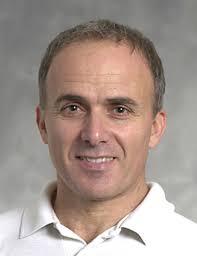
Born in Israel, Prof. Yosef Yarden received his BSc in biological and geological sciences from the Hebrew University of Jerusalem (1980), and a Ph.D. in molecular biology from the Weizmann Institute of Science (1985). His postdoctoral training was undertaken at Genentech, Inc., in San Francisco and at the Massachusetts Institute of Technology. In 1988, he joined the Weizmann Institute of Science’s faculty. At the Institute, he has served as Dean of the Faculty of Biology (1997-1999), Vice President for Academic Affairs (1999-2001), the first Director of the MD Moross Institute for Cancer Research (1999-2001), and Dean of the Feinberg Graduate School (2001-2007). He is the new director of the Institute for Cancer Therapy Research of the Moross Integrated Cancer Center and is the Harold and Zelda Goldenberg Professor of Molecular Cell Biology.
Prof. Yarden’s research focuses on a vital family of proteins called “growth factors,” hormone-like molecules that play a critical role in embryo development and wound healing; and, particularly, on a group of four membrane-bound cellular proteins known as “epidermal growth factor receptors.” His research is helping to shed light on the way growth factors and their receptors promote tumor growth. Prof. Yarden discovered the function of a molecular amplifier, called HER2, that strengthens the chemical signals that cause cells to become cancerous. This amplifier is an enzyme and a receptor found in large quantities on cancerous cell membranes, especially in breast, ovary, and gastric tumors. This finding established a foundation for new cancer treatments based on “silencing” the molecular amplifier.
From 2011 till 2014 Prof. Yarden served as President of the Federations of Israeli Societies of Experimental Biology (FISEB/ILANIT). Among his many honors and awards are the EMET Prize in Biochemistry (2007), the 43rd Leoplod Griffuel Award of Fondation ARC pour la Recherche sur le Cancer (2015), the 2008 Hamilton Fairly Award of the European Societies of Clinical Oncology (ESMO), the MERIT award of the U.S. National Cancer Institute (2005), the TEVA Founders Prize (2004), and the Michael Bruno Prize of the Yad Hanadiv (Rothschild) Fund (2000). In 2010 he was the recipient of the Ernst W. Bertner Memorial Award from the University of Texas’ MD Anderson Cancer Center, and, in 2012, the Susan G. Komen for the Cure® Brinker Award for Scientific Distinction in Basic Research. He was elected to the Israel Academy of Scien nd Humanities in 2007.
